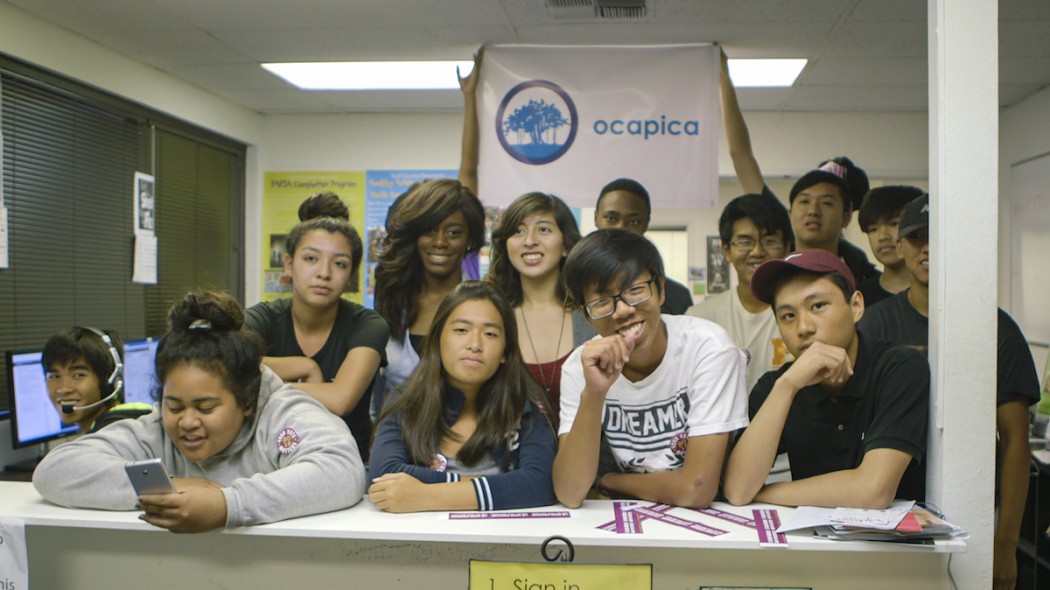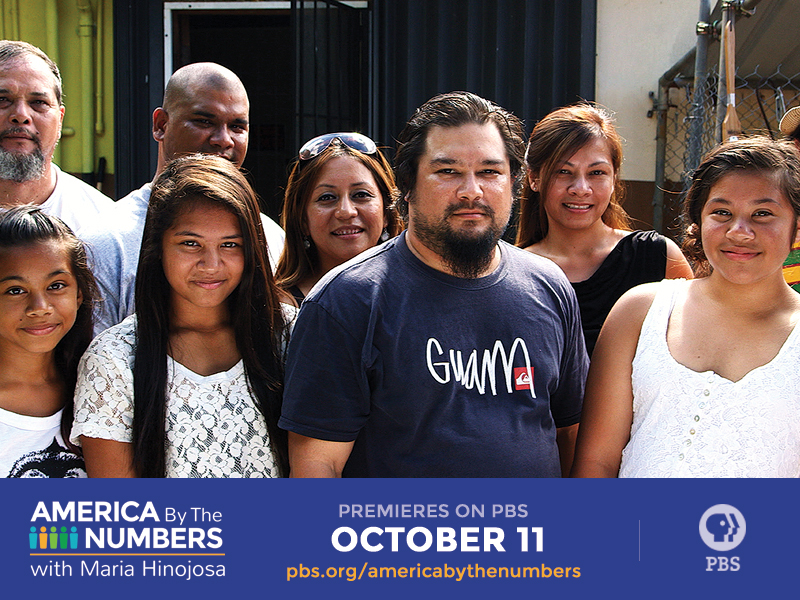A new episode of the PBS series America By The Numbers with Maria Hinojosa is set to premiere September 6, 2016. The popular public broadcast series takes on “underreported stories from every corner of the nation, reveal[ing] the human face of the biggest population change in U.S. history.”
Last season explored the changing demographics of the United States, including challenges facing young Cambodian Americans in Long Beach, CA. The upcoming standalone special, “The New Deciders,” airs two months shy of November 4th and focuses on changing in voting populations. The episode introduces viewers to some of the voters who may profoundly impact this impending election. Groups featured include Florida-based Latino Evangelicals, Arab Americans in Ohio battling Islamophobia, Black activist millennials in North Carolina, and Southern California Asian American political candidates.
The episode documents how different racial, religious, and ethnic groups grapple with headlining issues on the ground, such as police violence, Islamophobia, or immigration. Their stories encompass wide-ranging experiences and political beliefs, cracking open the narrative that racial, religious or ethnic group are monolithic. It is exciting that these diverse and complex narratives will be played out the television screen, such as the ways Asian Americans are set to be portrayed. A segment on Asian Americans in Southern California follows both Democrat and Republican candidates, highlighting the diversity of political values and interests Asian Americans hold. The episode also focuses on the fight against Islamophobia which, while not included in the episode, impacts both Muslim and Muslim-perceived South Asian communities across the country.
The series is hosted and produced by the president and founder of Futuro Media Group and executive producer of NPR’s award-winning radio show Latino USA, Maria Hinojosa. I spoke to Hinojosa about “The New Deciders” and the role of journalists and media-makers in covering the upcoming election.
-Mika Hernandez
Can you give me an overview of this special episode and what sparked its creation? How does this special differ from other episodes of America By The Numbers?
It’s a one hour special as a opposed to eight episodes. We took on the challenge of telling the story of this amazing electoral year in politics and condensing it into a compact hour divided into four distinct segments. The first one looks at Black Millennial engagement in North Carolina. Black young voters are outpacing white voters at every turn and very specifically in North Carolina. We wanted to look at Black millennials on every side of the political spectrum. For example, we examine the activism around Black Lives Matter and how that’s propelling many to have a voice and yet they’re not finding their voice through voting. They could swing the election but many of them say, “Voting is not where I find my political power and passion.” The second story is in Ohio, another key swing state that like North Carolina, is huge. We focus on the story of Arab Americans and Muslim American voters. Not all Arab Americans are Muslims and not all Muslim Americans are Arab Americans, but there is a large intersection. Ohio’s Arab American population is the eighth largest in the country. They are a sliver of the statewide vote but in a tied election they could swing it. Arab Americans and Muslim Americans have turned away from the Republican party after 9/11 and they are registering voters in mosques. That story asks: are they owning their power and how? Then we go to Latino Evangelicals in central Florida. You think of Latino Evangelicals and you think pro-life, conservative and Republican. But these Evangelicals are very progressive and anti-Trump. They are called the most unpredictable voters and yet they can swing the state of Florida, which is huge! We’re really looking at these slivers of demographics where they can swing key states that change the entire electoral map. Finally, we don’t focus on another swing state, but we find it very interesting that the Republican party in Southern California, specifically Orange County, is now actively recruiting Asian American women to run as Republicans. As opposed to Trump, they’re owning demographic diversity in their politics and embracing it. We look at these key electoral groups that have us asking the question will they be the “new deciders?”

How did you chose the groups highlighted in this episode?
We spent weeks really nailing it down to stories that are really challenging. To film a politics documentary that runs before the election that has action and passion is challenging. We feel that these four stories really represent a sliver of this new, changing diverse America who are central in the conversation of politics in 2016. How much media is being produced by the groups that are central to these conversations? America By The Numbers really represents the groups. We have one of the diverse staffs in public television. We believe that the reason our numbers have been so phenomenal and why we have such strong viewership with diverse communities, while keeping the white audience of PBS, is because we are focusing on these groups in all of their complexity which a lot of media is not reporting on. We’re doing it in a way that captures complexity, has a critical eye, but has humanity. We take pride on having characters that you’re going to be able to connect with on a human level.
While they share some identities and experiences, I imagine there is still diversity amongst the people in these groups you highlight. Were there tensions or differences you found surprising?
No…You know with Latino USA for example, we’re getting ready to do a whole hour on Muslim-Latino intersectionality. In “The New Deciders,” during our Arab American segment, one of our characters who is Muslim American is not Arab American, she’s white. And yet she talks all about the very specific attacks on the constitutional rights of American citizens just because they are Muslim. In our segment in North Carolina we are focusing on African American millennials who are Republican but are also members of Black Lives Matter. That includes a large section of trans Black millennials who are front and center in the fight against House Bill 2. We pride ourselves on actually showing that within a community that you might think is monolithic, it’s more complicated than you think. That’s what our stance and what our journalism is. We pride ourselves on jumping into that complexity.
It’s really cool to see a program that is complicating and diversifying the narrative. I appreciate that. Okay, one last question: what are your reflections on the role media has played thus far in shaping the upcoming election?
Is that journalists of color specifically?
I’m curious about your reflections on media as a whole but also as journalists of color, what the role is there.
I am just on the heels of a joint conference between The Association of Black Journalists and the Association of Hispanic Journalists last week. There was a lot of talk about this there. When what’s happening in terms of Black Lives Matter is central to the conversation in both the Republican and Democrat platforms, when Latinos are central to the conversation, we ask what the role and responsibility of a journalist of color is in this moment. I know I am proud of the fact that my company and I represent the perspective of a large part of America which used to be “the other” but is now absolutely mainstream. But the truth is that in my core, as a media-maker, I’m a journalist. So you strip away all of that stuff and what we really want to do is to be the best journalists we can be. What that means is telling stories about the America that we live in, not the America that people imagine. We want to capture this amazing moment in American history. I think the core of journalism is to hold people accountable, speak truth to power, be critical, give voice to the voiceless. It’s hard to believe that even though I have been doing this for so long that at this point in my career I can say that my work is more important than perhaps ever in my career. We move in our media creation with that sense of responsibility and understanding that how we add to the complexity of the conversation is going to affect people. I was just sitting here watching the rough cut thinking, are young people of color, other activists, going to watch this show and suddenly decide that they want to become politically engaged because they saw someone who looked like them doing a kind of political activism that reflects them? Wow! That would amazing. I get teary. I understand that what we are doing is going to change lives. And at a time where there is so much untruth out there, we take this work so seriously. We do it with a tremendous amount of love and respect for the viewers across the board.
+ + +
For more information about America By The Numbers, a CAAM-funded series, visit the website.
This interview has been edited for length and clarity.
Mika Hernandez is a queer mixed Asian American-Xicana born and living on occupied Chochenyo and Karkin Ohlone land (Oakland, CA). She is a writer, artist, and community organizer passionate about the intersections of reproductive, racial, and food justice work. You can follow her work at hernandezmika.wordpress.com.




